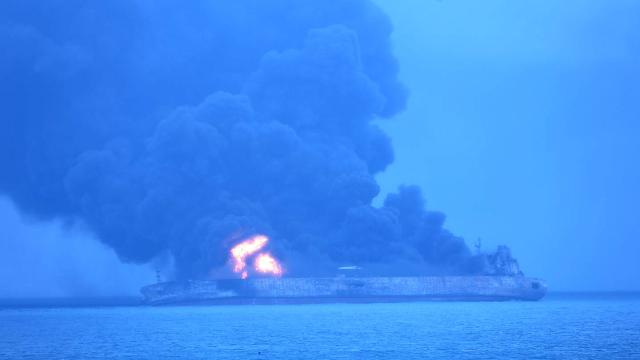This past Saturday, a tanker transporting oil from Iran to South Korea collided with a freighter about 300km off the coast of Shanghai. The tanker, filled with 130 tonnes of highly volatile condensate crude, has been burning for the past three days, raising fears of an environmental catastrophe.
The Sanchi burns about 160 nautical miles from the coast of China. (Image: Korea Coast Guard/AP)
As Reuters reports, the tanker, named Sanchi, collided with a Hong Kong-registered freighter off China’s eastern coast. The tanker’s crew of 32 are missing; one unidentified body has been recovered. The freighter, which was carrying US grain, experienced little damage, and all 21 of its crew members have been rescued. The Sanchi, owned by National Iranian Tanker Co, was en route to South Korea when the collision happened.
The tanker has been burning for three straight days as rescue crews struggle to bring the blaze under control. It’s filled with 136,000 tonnes (about one million barrels) of highly volatile condensate oil worth about $US60 million ($77 million), reports Reuters. If a spill happens, it would be the worst oil spill since 1991, when 260,000 tonnes of oil spilled off the Angolan coast. Officials don’t yet know whether condensate has leaked from the tanker.
Officials with China’s Ministry of Transport and Maritime Safety did not say when the fire might be put out. Bad weather and toxic fumes are making it difficult for crews to access the tanker.
As noted, the ship is filled with an ultra-light crude condensate – a type of oil that condenses into a liquid after it’s extracted (the condensate in the Sanchi came from crude oil). Condensates are used to produce products such as petrol, jet fuel and heating fuels. It’s colourless and odourless, but more flammable than conventional oil.
“Gas condensates represent the ‘light ends’ of oil – that is, the low molecular weight compounds that are highly volatile and flammable, and very similar to gasoline,” Peter Hodson, a professor in the Department of Biology and School of Environmental Studies at Queen’s University, told Gizmodo via email. “The hazards from a spill include fire and explosion (the circumstance at the site of the accident) and rapid mortality of any surface animals (marine birds and marine mammals), or fish and invertebrates just underneath the surface (top 10 meters of water).”
Hodson says that, as long as the condensates continue to be released from the ship, the risk of these effects will be very high. But once the ship stops leaking (when it’s emptied of oil), these risks will decrease quickly. That’s because condensates evaporate and are diluted in air, and the condensates dissolved in water will be rapidly diluted to below the threshold of toxicity.
“The risk to oil spill responders is obviously high during the spill and fire, and if there is no one left on the ship, it may be simplest to let it burn out,” added Hodson. “However, the heat of the fire may destroy the hull, allowing heavy fuel oil in the ship’s tanks to leak. The heavy fuel oil is also flammable, and could burn if exposed to the condensate fire – surface slicks at the Deepwater Horizon spill were treated with burning agents to reduce their size. If the heavy oil leaks, it will create the typical conditions that we associate with traditional ship wrecks, i.e., a heavy black oil slick, oil coating of birds and marine mammals, and a residue that may ultimately contaminate shorelines or sink and contaminate bottom sediments.”
Babatunde Anifowosem, a senior lecturer in petroleum and environmental technology at the University of Coventry in the UK, told CNN that an explosion would be the worst outcome. After a blast, the oil would seep out beneath the surface of the water, making cleanup much more difficult, he said. An explosion would also spread more toxic fumes, which could spread inland and trigger respiratory problems among vulnerable populations.
According to Reuters, China has sent four rescue ships and three cleaning boats to the site, while South Korea has sent a helicopter. US Navy military craft have also been brought into help with the rescue operations. The cause of the collision is still not known, but the Sanchi was travelling in waters not frequently traversed by large vessels, which typically travel closer to the Chinese coast or nearer to Japan.
